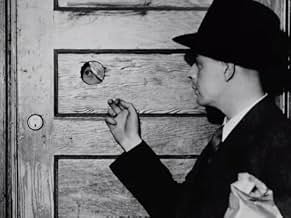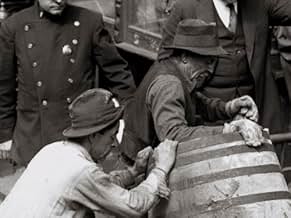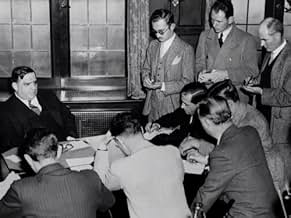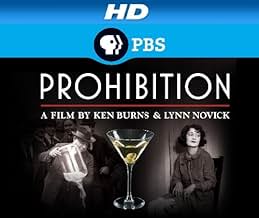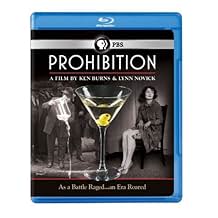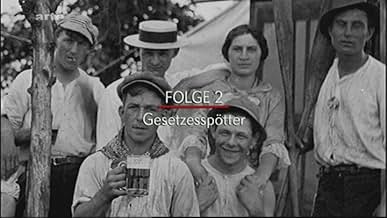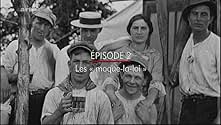NOTE IMDb
8,2/10
3,6 k
MA NOTE
Ajouter une intrigue dans votre langueThe story of the American activist struggle against the influence of alcohol, climaxing in the failed early 20th century nationwide era when it was banned.The story of the American activist struggle against the influence of alcohol, climaxing in the failed early 20th century nationwide era when it was banned.The story of the American activist struggle against the influence of alcohol, climaxing in the failed early 20th century nationwide era when it was banned.
- Récompensé par 1 Primetime Emmy
- 1 victoire et 3 nominations au total
Parcourir les épisodes
Avis à la une
My favorite comment in this documentary is offered by Pete Hamill, American journalist, novelist and essayist, who said basically if you want people to brush their teeth, pass a law banning toothpaste. And then people will do everything they can to acquire toothpaste illegally, and they'll brush their teeth just to spite the law. The unforeseen consequence of Prohibition is that once you take away a person's right to do something that people have always done, people will feel the desire to want it much more intensely, in the same way if you deny a child all sweets, the kid will be sneaking chocolate inside his jacket sleeves. Hamill later says he doesn't drink, but he would probably take a swig in front of a government building if the law ever forbade him from doing it. Encouraging moderation is not the same as banning something completely.
The other comment worth noting concerns repeal crusader Pauline Sabin who had been entrenched in republican politics prior to 1928. Republican congressmen would vote to adhere to the strictest of prohibition laws as laid out by the Volstead Act and then go to one of Sabin's parties demanding a drink. She concluded that the United States had become "a Nation of Hypocrites", which is the title of the third installment of Burn's documentary. Sabin becomes an unlikely hero who would sway the country against Prohibition and the eventual repeal of the 18th Amendment of the Constitution, the only amendment so dignified. Ironically, Daniel Okrent points out that today alcohol is somewhat harder to come by than during Prohibition because of liquor laws, underage drinking laws, etc. When alcohol was strictly forbidden, there was nothing in place to regulate it, except for raids on speakeasies and private distilleries.
Based in part on Daniel Okrent's "Last Call: The Rise and Fall of Prohibition", Ken Burns and Lynn Novick's "Prohibition" is a thoroughly entertaining, simultaneously humorous and "sobering" look at one of the strangest episodes in American legal history. The documentary is in three parts, the first chronicling the birth of the temperance movement which began in the 1820's almost a century before the ratification of the 18th Amendment. No question that alcohol was a problem for some people, mostly among the rural poor, but the temperance movement decided alcohol itself was the problem and vowed its eradication by the late 19th century. The first part ends with the ratification of the 18th Amendment to the US Constitution prohibiting not only the sale but importation of alcohol. Part two concerns the passage of the Volstead Act designed to enforce the amendment, and the immediate consequences of trying to stop people from drinking, and the antithetical results, such as lawlessness and bribery. The third and most sobering of the episodes chronicles many of the unintended consequences, such as the violence erupting in Chicago and the night club craze. The documentary ends with the movement for the repeal of the 18th Amendment.
The unforeseen catastrophes of the 18th Amendment which were designed to heighten American morality and assuage drunkenness turned America into one of the most alcoholic-driven nations among the industrialized world. Americans drank more booze, partied more, got more drunk, and flaunted the law more often during Prohibition than at any other time in the nation's history since after the Civil War, even as compared to the present time. Possibly only the 1960's are somewhat comparable to the mayhem of the 1920's.
The irony of ironies that the decade begun by the Temperance Movement's victory with the passage of the 18th Amendment to the US Constitution in 1919 would be nicknamed the Roarding Twenties and the Jazz Age. This was not a decade known for drinking milk. This was a decade characterized by cocktail glasses in the hands of flappers dancing on tables to the evocative music of Duke Ellington and Count Basie. Men would be raising giant mugs of frothy beer in underground establishments called speakeasies. Only Prohibition allowed the likes of Al Capone and Lucky Luciano to become wealthy gangsters, almost movie stars by today's standards. The leaders of the Temperance Movement, particularly the Woman's Christian Temperance Union and the Anti-Saloon League, were appalled when their daughters ran off to speakeasies and night clubs to partake of the forbidden fruit. Strangely, Prohibition helped usher in the Night Club culture of America which has continued unabated ever since. All the great night clubs famous for their booze, music, and dancing such as the Cotton Club and the Stork Club, were incepted when alcohol was supposed to be illegal.
For some reason, I didn't think Prohibition permeated into so many aspects of American life during its enforcement from 1920 through 1932. People could open small businesses in their basements and make a fortune through bootlegging, and then be hauled away under the Volstead Act. The rise of the Chicago Gang syndicate became a prototype for similar syndicates across the country, all vying for their bootlegging territory. At one point, citizens were legally compelled to snitch on neighbors suspected of bootlegging. The story as presented by Burns/Novick is as compelling as any action thriller being produced today. A great movie of American history, with all the elements that make a great story. Essentially it's a legal thriller with sex, violence, and lots of booze. Lots of it.
The other comment worth noting concerns repeal crusader Pauline Sabin who had been entrenched in republican politics prior to 1928. Republican congressmen would vote to adhere to the strictest of prohibition laws as laid out by the Volstead Act and then go to one of Sabin's parties demanding a drink. She concluded that the United States had become "a Nation of Hypocrites", which is the title of the third installment of Burn's documentary. Sabin becomes an unlikely hero who would sway the country against Prohibition and the eventual repeal of the 18th Amendment of the Constitution, the only amendment so dignified. Ironically, Daniel Okrent points out that today alcohol is somewhat harder to come by than during Prohibition because of liquor laws, underage drinking laws, etc. When alcohol was strictly forbidden, there was nothing in place to regulate it, except for raids on speakeasies and private distilleries.
Based in part on Daniel Okrent's "Last Call: The Rise and Fall of Prohibition", Ken Burns and Lynn Novick's "Prohibition" is a thoroughly entertaining, simultaneously humorous and "sobering" look at one of the strangest episodes in American legal history. The documentary is in three parts, the first chronicling the birth of the temperance movement which began in the 1820's almost a century before the ratification of the 18th Amendment. No question that alcohol was a problem for some people, mostly among the rural poor, but the temperance movement decided alcohol itself was the problem and vowed its eradication by the late 19th century. The first part ends with the ratification of the 18th Amendment to the US Constitution prohibiting not only the sale but importation of alcohol. Part two concerns the passage of the Volstead Act designed to enforce the amendment, and the immediate consequences of trying to stop people from drinking, and the antithetical results, such as lawlessness and bribery. The third and most sobering of the episodes chronicles many of the unintended consequences, such as the violence erupting in Chicago and the night club craze. The documentary ends with the movement for the repeal of the 18th Amendment.
The unforeseen catastrophes of the 18th Amendment which were designed to heighten American morality and assuage drunkenness turned America into one of the most alcoholic-driven nations among the industrialized world. Americans drank more booze, partied more, got more drunk, and flaunted the law more often during Prohibition than at any other time in the nation's history since after the Civil War, even as compared to the present time. Possibly only the 1960's are somewhat comparable to the mayhem of the 1920's.
The irony of ironies that the decade begun by the Temperance Movement's victory with the passage of the 18th Amendment to the US Constitution in 1919 would be nicknamed the Roarding Twenties and the Jazz Age. This was not a decade known for drinking milk. This was a decade characterized by cocktail glasses in the hands of flappers dancing on tables to the evocative music of Duke Ellington and Count Basie. Men would be raising giant mugs of frothy beer in underground establishments called speakeasies. Only Prohibition allowed the likes of Al Capone and Lucky Luciano to become wealthy gangsters, almost movie stars by today's standards. The leaders of the Temperance Movement, particularly the Woman's Christian Temperance Union and the Anti-Saloon League, were appalled when their daughters ran off to speakeasies and night clubs to partake of the forbidden fruit. Strangely, Prohibition helped usher in the Night Club culture of America which has continued unabated ever since. All the great night clubs famous for their booze, music, and dancing such as the Cotton Club and the Stork Club, were incepted when alcohol was supposed to be illegal.
For some reason, I didn't think Prohibition permeated into so many aspects of American life during its enforcement from 1920 through 1932. People could open small businesses in their basements and make a fortune through bootlegging, and then be hauled away under the Volstead Act. The rise of the Chicago Gang syndicate became a prototype for similar syndicates across the country, all vying for their bootlegging territory. At one point, citizens were legally compelled to snitch on neighbors suspected of bootlegging. The story as presented by Burns/Novick is as compelling as any action thriller being produced today. A great movie of American history, with all the elements that make a great story. Essentially it's a legal thriller with sex, violence, and lots of booze. Lots of it.
It might be a bold statement, but I personally feel that Prohibition was arguably the biggest mistake America ever made, with the possible exception of the Vietnam War. Ken Burns, already well known for making a great deal of extremely high quality films and documentaries about a variety of subjects (including the aforementioned one), has once again delivered a riveting and deeply interesting experience that no history aficionado should miss. Although this series is shorter than many of his others, it's no less intriguing as it delves into how the movement to get alcohol banned in the United States actually started almost a century before the amendment banning it was passed. We learn how it was endorsed by a lot of different groups of people (many of them women), and they all had different reasons for wanting to see it go. Many priests had heard countless stories of women being abused by their husbands, ordinarily mellow people being turned into brutes, and children being neglected all because of drinking. Many had seen how beer and wine could ruin not just one person, but whole communities. The film does a great job of showing every conceivable angle to the story of prohibition, and discusses in detail how people, many of them Irish and German immigrants who loved to drink, tried their hardest to make sure it wouldn't go anywhere. Many bar and saloon owners were convinced such a ridiculous act would never happen, as the federal government was too reliant on taxes paid by these establishments. Meanwhile, once prohibition actually came into effect, people who were law abiding citizens before the act became criminals just to get what they viewed as theirs in the first place, and those who were already criminals became even more wealthy, as many new opportunities were opened. Of course, you can't talk about this era and not bring up the mobster aspect of it. Thugs like Al Capone (who was sometimes seen as someone much more respectable than just a thug) ran huge, elaborate bootlegging operations that encompassed entire cities, had their minions kill or threaten anyone who stood in their way, and left a legacy on america that's still talked about now. Burns also masterfully explains how the horrendous flu pandemic of 1918 and the First World War, both of which left millions dead, contributed to a much more flippant and hedonistic way of living which resulted in flappers. Women came to realize that life was short and you can die at any moment, so they dove into a sexualized lifestyle that made their Victorian parents quite angry. Despite the fact that prohibition was tearing the country apart, people were still breaking the law left and right and drinking whenever they wanted to. Thousands of speakeasies were operated all across america. These carefree times would eventually come to a tragic and sudden end in 1929, when a stock market crash caused the most dire emergency america had faced since the Civil War. This is just a small selection of the things talked about in this documentary. If you're like me and you've already seen Burns' masterpiece on the vietnam war (probably the best thing he ever did), you'll feel right at home. The same narrator is here, and there's more than enough archive footage. All I can say is if you like to drink, and especially if you don't like to, then this is for you.
Prohibition took place in the early 1900's, was unpopular, and was repealed. That was the extent of my knowledge on prohibition. Ken Burns proved that such a big part of our country's history is worth taking a closer look at.
The storytelling is excellent, with interviews of and narration by folks you'll likely recognize. The archival footage is eye-opening and heartbreaking. The comic relief is perfectly timed, and the facts presented here linger on the mind long after the TV is off.
Personal preference will dictate whether the film's length outlasts its charm. I usually like things short and sweet, but I couldn't hold myself to a single episode in one sitting. However, at 5 hours it'll probably wear down the patience of some viewers.
The only other downside I can think of is that some points are overly expounded upon, while other enticing tidbits will be mentioned briefly but not fully exemplified. I almost doubled the length of one episode by continuously pausing and googling something for more clarification.
Of course, that could've been Ken's plan all along.
The storytelling is excellent, with interviews of and narration by folks you'll likely recognize. The archival footage is eye-opening and heartbreaking. The comic relief is perfectly timed, and the facts presented here linger on the mind long after the TV is off.
Personal preference will dictate whether the film's length outlasts its charm. I usually like things short and sweet, but I couldn't hold myself to a single episode in one sitting. However, at 5 hours it'll probably wear down the patience of some viewers.
The only other downside I can think of is that some points are overly expounded upon, while other enticing tidbits will be mentioned briefly but not fully exemplified. I almost doubled the length of one episode by continuously pausing and googling something for more clarification.
Of course, that could've been Ken's plan all along.
Daniel Okrent's "Last Call: The Rise and Fall of Prohibition" and Ken Burns and Lynn Novick's "Prohibition" mini-series were two similar projects that began together resulting in two different end products. Together, both provide a rather detailed account not only of Prohibition's place in American history, but the events leading up to such, the results of repeal and the long-lasting societal impact of the entire matter. Separate, both are still strong, informative and entertaining yet each tend to focus on different themes that sometimes do not intermingle and the result is noticeable.
Ken Burns, in his trademarked fashion, intermingles fantastically- original photos and video with colorful interviews from subject-matter experts and first-hand histories over-laced with celebrity voice-overs, makes learning hip and brings about a passion for a dark, but necessary, time in American history. Burns' documentary was too light in certain instances where a deeper look at American history would have benefited the story. Okrent's novel definitely fills in such details that Burns either ignored or edited out but was definitely too heavy at times with whole sections coming across as a historical text book rather than an entertaining narrative.
Burns, and Okrent as well, enlighten 21st-Century audiences to the fact that Prohibition, what can be now considered a silly arrangement, was not only responsible for the rise of Jazz, the introduction of mixed drinks and the invention of speed boats but also led to very beginnings of the Civil Rights Movement and the outright success of Women's Suffrage.
Naturally, Burns provides much attention to that of the gangsters of the era, particularly Chicago's Al Capone. But again, he provides just enough details for a satisfactory display of information yet fails to get deeper. Similarly, this occurs when discussing the role of the Church and the Prohibition movement. Dry Congressmen and Senators knew how to convince their Baptist and Methodist ministers to use the pulpit to condemn the evils of alcohol, particularly in the Mid-West states.
Likewise, Prohibition was an outcry not just against alcohol but also against the rise of poor immigrants filling America's urban centers. The Irish, the Germans, the Italians, all known for enjoying wine and spirits, and all Catholics, became a scary threat for "decent, Protestant country folks". Cutting off immigrants from their alcohol was a way to ensure that these new Americans were productive members of society, not a burden of filthy drunkards. Burns did not spend too much time on these ideals.
However, Burns attention to detail and crafting of a narrative tale is shown in his vision and with what is presented. He does keep entertainment at the forefront of his documentary, much like what he has done in the past, especially with his must-see Baseball series. Some indirect humor is presented with history playing the comedian to a more naïve time. Burns does get political with some of his views, but at no time are such views sobering enough to prevent the viewer from seeking out a drink.
Ken Burns, in his trademarked fashion, intermingles fantastically- original photos and video with colorful interviews from subject-matter experts and first-hand histories over-laced with celebrity voice-overs, makes learning hip and brings about a passion for a dark, but necessary, time in American history. Burns' documentary was too light in certain instances where a deeper look at American history would have benefited the story. Okrent's novel definitely fills in such details that Burns either ignored or edited out but was definitely too heavy at times with whole sections coming across as a historical text book rather than an entertaining narrative.
Burns, and Okrent as well, enlighten 21st-Century audiences to the fact that Prohibition, what can be now considered a silly arrangement, was not only responsible for the rise of Jazz, the introduction of mixed drinks and the invention of speed boats but also led to very beginnings of the Civil Rights Movement and the outright success of Women's Suffrage.
Naturally, Burns provides much attention to that of the gangsters of the era, particularly Chicago's Al Capone. But again, he provides just enough details for a satisfactory display of information yet fails to get deeper. Similarly, this occurs when discussing the role of the Church and the Prohibition movement. Dry Congressmen and Senators knew how to convince their Baptist and Methodist ministers to use the pulpit to condemn the evils of alcohol, particularly in the Mid-West states.
Likewise, Prohibition was an outcry not just against alcohol but also against the rise of poor immigrants filling America's urban centers. The Irish, the Germans, the Italians, all known for enjoying wine and spirits, and all Catholics, became a scary threat for "decent, Protestant country folks". Cutting off immigrants from their alcohol was a way to ensure that these new Americans were productive members of society, not a burden of filthy drunkards. Burns did not spend too much time on these ideals.
However, Burns attention to detail and crafting of a narrative tale is shown in his vision and with what is presented. He does keep entertainment at the forefront of his documentary, much like what he has done in the past, especially with his must-see Baseball series. Some indirect humor is presented with history playing the comedian to a more naïve time. Burns does get political with some of his views, but at no time are such views sobering enough to prevent the viewer from seeking out a drink.
This huge three-part series covers a lot of ground on not only the failed prohibition laws in the US but also of America's turbulent love affair with alcohol.
Le saviez-vous
- AnecdotesAlthough the documentary gives the etymology of the term 'bootlegging' (people selling illegal liquor from flasks that they kept in their boot legs), the origin of the term 'speakeasy' is not further explained. According to the Etymology Dictionary, these illegal liquor saloons were called 'speakeasies' "because of the practice of speaking quietly about such a place in public, or when inside it, so as not to alert the police or neighbors".
- ConnexionsFeatured in CBS 11 News: Épisode datant du 17 août 2011 (2011)
Meilleurs choix
Connectez-vous pour évaluer et suivre la liste de favoris afin de recevoir des recommandations personnalisées
- How many seasons does Prohibition have?Alimenté par Alexa
Détails
- Durée
- 1h(60 min)
- Couleur
- Mixage
- Rapport de forme
- 16:9 HD
Contribuer à cette page
Suggérer une modification ou ajouter du contenu manquant

